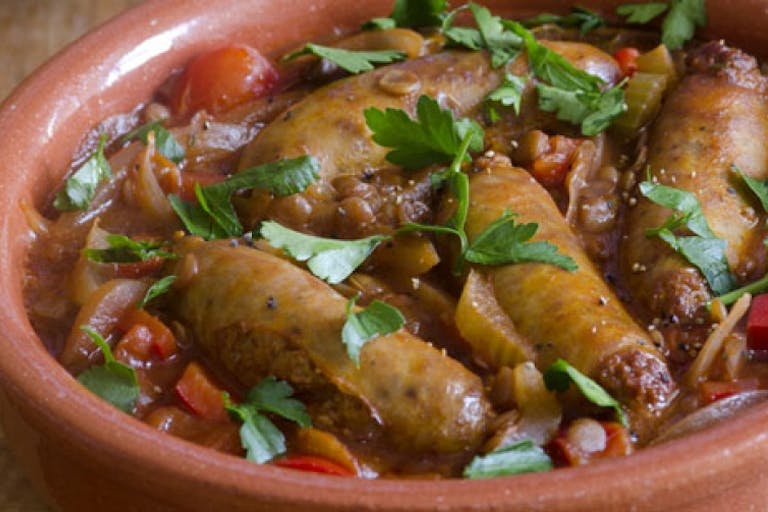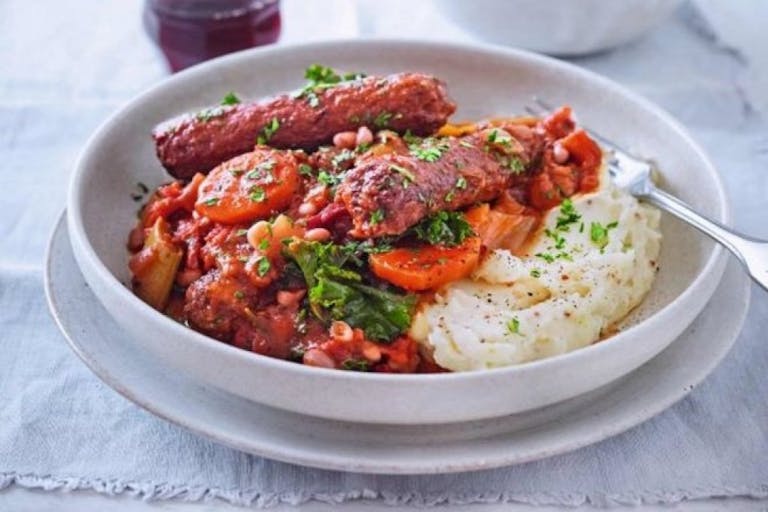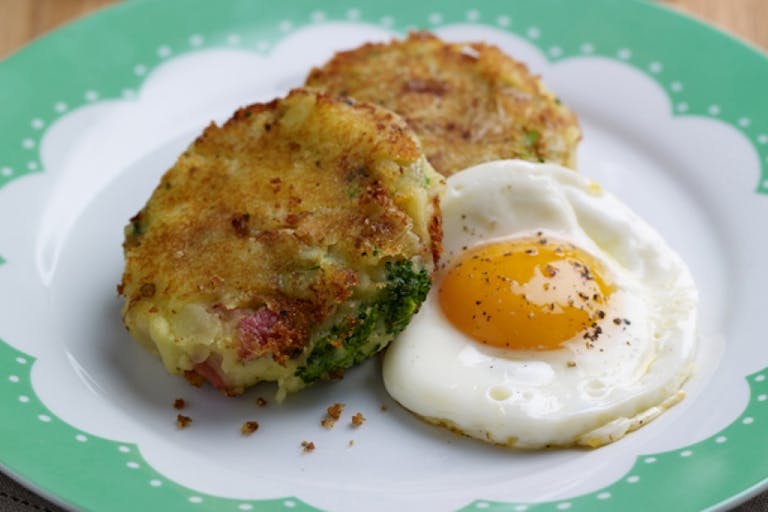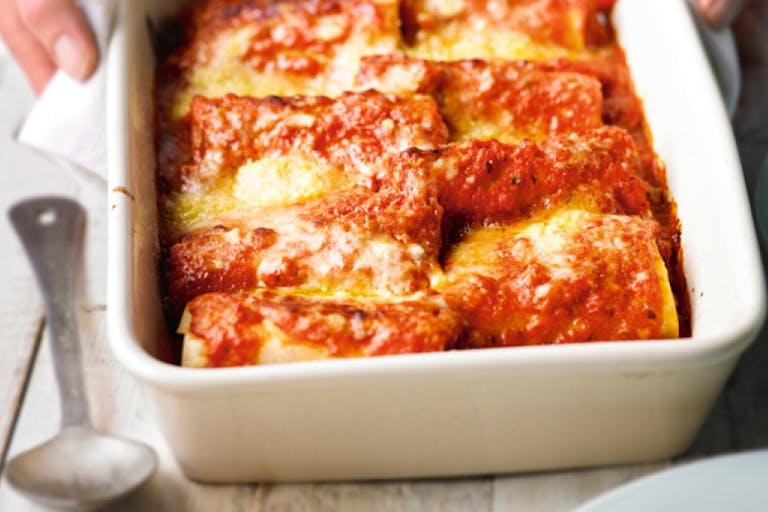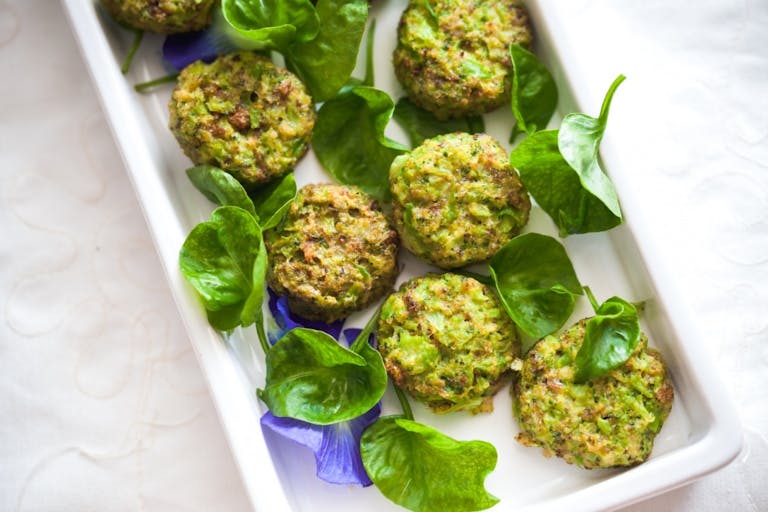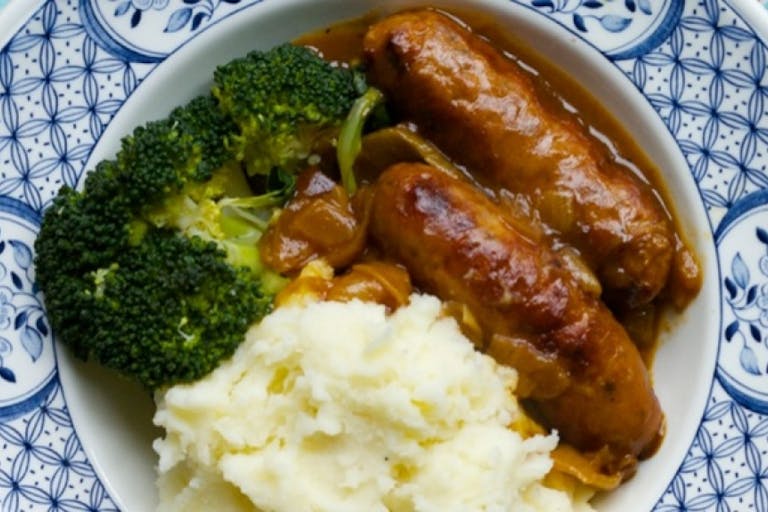This page contains affiliate links, which means we may earn a small amount of money if a reader clicks through and makes a purchase. All our articles and reviews are written independently by the Netmums editorial team.
Slow-cooker vegetarian sausage and bean stew
This Vegetarian Sausage Casserole is a delightful twist on the classic that's perfect for feeding the whole family. From tiny tots to teens, this dish is sure to please. Let's explore what vegetarian sausages have to offer!
- Recipe:
- Photo:
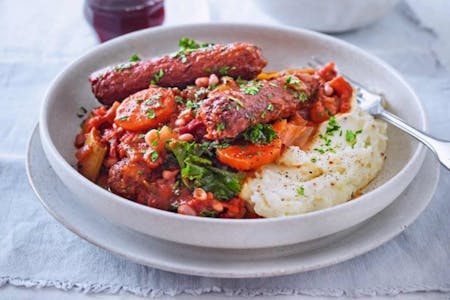
- Difficulty: Easy
- Serves 4
- Vegan
- Vegetarian
- Freezable
- Dairy Free
Preparation
- Total time
- 3 Hrs 35 Mins
- Preparation time
- 35 Mins
- Cooking time
- 3 Hrs
3 tbsp olive oil
1 onion, chopped
2 garlic cloves, finely sliced
8 vegetarian sausages (defrost frozen sausages overnight in the fridge before using)
2 carrots, peeled and thickly sliced
1 leek, trimmed, cleaned and thickly sliced
1 x 400g can chopped tomatoes
200ml red wine (or water/vegetable stock if preferred or serving to children)
2 tbsp tomato purée
2 roasted red peppers from a jar, thinly sliced
Pinch of dried chilli flakes
1/2 tsp dried oregano
2 rosemary sprigs
2 thyme sprigs
1 x 400g can haricot or cannellini beans, drained and rinsed
100g kale, stems removed and leaves roughly torn
2 tbsp chopped parsley, to garnish
Heat 2 tbsp of the oil in a large frying pan over a low-medium heat. Add the onion and fry for 5 minutes, until soft and translucent. Stir in the garlic and fry for 3 minutes until the onion and garlic are lightly golden. Transfer to the slow cooker.
Return the pan to the heat, add the remaining oil and the vegetarian sausages and fry for about 15 minutes until golden brown on all sides.
Transfer the sausages to the slow cooker and add the carrots, leek, chopped tomatoes, wine, tomato purée, red peppers, chilli flakes and oregano.
Fill up the empty chopped tomatoes can with water, right to the top, then pour in. Season well with salt and pepper, then add the rosemary and thyme. Cover with the lid and cook on high for 2 hours.
Stir in the beans, replace the lid and cook for a further 50 minutes, then add the kale. Replace the lid and continue to cook for 10 minutes until the kale is tender. Adjust the seasoning to taste.
Garnish with the chopped parsley and serve with creamy mashed potato.
You will need
Slow cooker
Large non-stick frying pan
Tips
Heads up, vegetarians! This recipe takes into account the non-meat meals you want to make, so take out your notes and read on for comforting, hearty dishes that bring warmth to our family dinners.
What can I use instead of meat in vegetarian sausage?
Creating a vegetarian sausage that's just as satisfying as its meaty counterpart is easier than you might think. There are several plant-based alternatives that can replicate the taste and texture of meat in your sausage. Here are some popular options:
- Soy-Based Sausages: Many vegetarian sausages are made from soy protein or tofu. These options provide a meaty texture and can be seasoned to mimic the flavours of traditional sausages.
- Seitan Sausages: Seitan, also known as wheat gluten, is another fantastic option. It has a chewy, meaty texture and can absorb a variety of flavours. Homemade seitan sausages can be seasoned to your liking.
- Legume-Based Sausages: Lentils, chickpeas, and black beans are excellent choices for a meatless sausage. When mashed or processed, they can mimic the texture of ground meat.
- Mushroom Sausages: Mushrooms, especially portobello or shiitake mushrooms, provide a rich umami flavour and a meaty texture. They work wonderfully in sausage-like preparations.
- Nut-Based Sausages: Nuts, such as almonds or walnuts, when finely ground and mixed with spices, can provide a satisfying sausage-like texture.
- Vegetable-Grain Mixtures: Combining vegetables like carrots, onions, and peppers with grains like quinoa or bulgur can yield a flavourful and textured vegetarian sausage.
- Store-Bought Options: There is a wide variety of vegetarian sausages available in stores, made from a combination of the ingredients mentioned above. These can be a convenient option for busy mums.
The key to a delicious vegetarian sausage is the seasoning. Experiment with different herbs, spices, and seasonings to create a flavour profile that your family loves.
Are vegetarian sausages healthier than meat?
Vegetarian sausages offer many health benefits when compared to their meaty counterparts.
They’re lower in saturated fat, which help reduce the risk of heart disease. They’re lower in cholesterol, unlike meat sausages. They are rich in fiber, which promotes digestive health, and reduces the risk of certain diseases, including type 2 diabetes and certain types of cancer. And they’re even environmentally friendly compared to meat production, making them a more sustainable choice.
Of course, not all vegetarian sausages are created equal. Some store-bought varieties may contain added preservatives, artificial flavours, or excessive amounts of sodium. To make the healthiest choice, look for options with minimal processing and natural ingredients.
As with any food, balance is key. Incorporating vegetarian sausages into your family's diet as part of a well-rounded, plant-based meal plan can offer health benefits while still providing the delicious flavours that your kids will love.
What are vegetarian sausages made of?
Vegetarian sausages are crafted from a wide range of plant-based ingredients, and their composition can vary depending on the brand and recipe. However, here are some common components found in vegetarian sausages:
- Protein Source: The primary protein source in vegetarian sausages often comes from ingredients like soy protein, tofu, seitan, legumes (such as lentils or chickpeas), or nuts. These ingredients provide the texture and structure.
- Binders: Binders are used to hold the sausage together. Common binders include wheat gluten (in seitan sausages), flaxseed meal, or starches like cornstarch or tapioca starch.
- Flavourings and Seasonings: Vegetarian sausages are heavily seasoned to mimic the taste of traditional sausages. This can include a mix of herbs, spices, garlic, onion, and various flavourings like liquid smoke for a smoky taste.
- Texture Enhancers: Ingredients like vegetable oil, cellulose, or agar-agar are sometimes added to achieve the desired texture.
- Colourants: Natural colourants such as beet juice, paprika, or turmeric may be used to give vegetarian sausages an appealing colour.
- Preservatives: Some store-bought varieties may contain preservatives to extend shelf life. If you prefer a more natural option, look for sausages with fewer additives.
Remember to read the ingredient list on the packaging to know exactly what's in the vegetarian sausages you choose. Homemade versions also allow you to have full control over the ingredients and tailor the sausages to your family's preferences.
What is a vegetarian sausage called?
Vegetarian sausages go by various names depending on their ingredients and regional preferences. Some common terms include Veggie Sausages, Plant-Based Sausages, Vegan Sausages, Meatless Sausages, Soy Sausages, Seitan Sausages, Nut Sausages, Lentil Sausages, Mushroom Sausages, or Grain Sausages.
These sausages can come in various flavours and styles, from classic to spicy to herbed, so you're sure to find one that suits your family's taste buds.
Incorporating vegetarian sausages into your family meals like plant-based banger stew can be a delicious and nutritious choice. These versatile meat alternatives offer a range of flavours and textures, making them a hit with toddlers to teenagers. Whether you're cooking up a vegetarian sausage casserole or experimenting with new recipes, embracing plant-based sausages is a fantastic way to savour the flavours of hearty meals while making a positive impact on your family's health and the environment. Happy cooking, mums!
Reviews
Lucy S(20)
★★★★★ Rated 5 out of 5 stars.Love this - made it with Quorn sausages and it went down a treat!
Reviewed on 14/01/21
